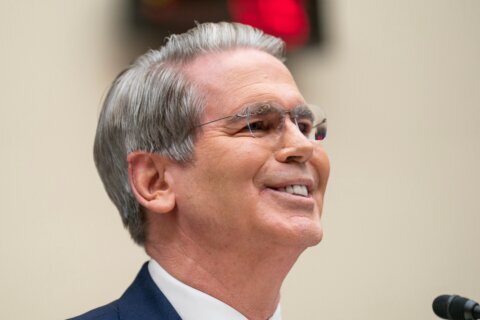WASHINGTON — Last week, Her Wealth™ hosted “An Evening with Leslie Bennetts.” The sold-out room of 150 women came to hear Bennetts, an award-winning journalist and acclaimed author of “Last Girl Before Freeway: The Life, Loves, Losses and Liberation of Joan Rivers.”
Bennetts shared the remarkable untold story of Rivers’ life — both her trials and triumphs. The writer also shared Rivers’ inspiring and enduring lessons for women in resiliency and courage, showing that it’s never too late for them to take control of their financial lives.
While many know Joan Rivers for her often-controversial comedic persona, most are unaware of the struggles she faced throughout her life. From a financial perspective, some of her greatest challenges happened at a time in life that one would be thinking about getting ready for retirement.
In 1987, Rivers was fired from her talk show by Fox Television along with her husband, Edgar Rosenberg, who served as her show’s producer. Shortly afterward, Edgar committed suicide, leaving her $37 million in debt.
At age 54, Rivers found herself single, without a job and financially broke. In the years that followed, she staged a remarkable comeback in all areas of her life and enjoyed her greatest financial success. She worked a grueling schedule and was still performing until her death in 2014 at age 81.
In listening to Bennetts describe Rivers’ life, one can see patterns that continue to be common to many women — from how her childhood shaped her beliefs and lifelong habits towards money to her reasons for abdicating control over her wealth. So how did this happen to Joan Rivers? How could such an outwardly successful and famous woman end up bankrupt in midlife?
Rivers’ story provides many important life lessons for women today.
Beauty and the beast
Like many women, Rivers was taught to believe that her value was in her desirability to men. This translated into her belief that marrying well was of utmost importance. It didn’t help that she was rejected many times (and many times to her face) by men, and that she had a sister who possessed the one thing Joan wanted more than anything — to be beautiful.
The story goes that her mother was so desperate to marry off Joan that she placed a sign in their yard reading “last girl before freeway.”
Even later in life, Rivers said she would have given up her fame and success if she could have been beautiful instead.
Rivers’ lessons learned
Another aspect of Rivers’ upbringing that influenced her attitude toward money was that she was raised by an upwardly mobile mother, desperate to have all of the trappings and privileges of wealth, and by a penny-pinching father who never attained the success his wife craved.
According to Rivers, there was an interesting dynamic between her mother and father when it came to money. Her father, a medical doctor with seemingly high income potential, never made a substantial-enough living to keep up with his wife’s demands. This left her caught in the middle, with her mother expecting luxury items that her husband couldn’t afford.
While Rivers would never make the mistake her mother did — being financially dependent on a man to provide her with the material things she wanted in life — she adopted her mother’s “big spender” ways. She spent incredible amounts of money on an opulent and over-the-top lifestyle.
Like Rivers, people’s attitudes and behaviors about money are often shaped by their early experiences, especially by how parents handled money, and the messages — good and bad — that those early experiences communicated. In Our Emotional Affair With Money,the power that these early messages have is explored. People can achieve balance between money and emotions, but they first must be aware of how one affects the other.
Rivers also struggled with the feeling of “having enough” — a fear commonly seen in people of all levels of wealth today. Bennetts writes that David Dangle, who ran Rivers’ QVC company said: “Money was always a big very big concern. It’s hard to get to where you think, ‘I’m going to have enough.’ I don’t think she ever got there.”
Tenacity and taboo topics
Rivers is often remembered for her courage and for saying what others were thinking. Having been told she had no talent by everyone (including her parents for 10 years), she simply would not take no for an answer. And Rivers brought something to comedy that no one had ever seen before, Bennetts writes: She spoke the truth about women’s feelings. She exposed the taboo topics that women, to that point, kept hidden.
Rivers also faced some of the same economic discrimination that women still face today.
“For the careers of female comics, the cost of male resistance is impossible to quantify, but its toll can be discerned in lost opportunities, critical double standards, wage gaps, and other professional obstacles,” Bennetts writes.
When you consider how many years ago this happened, women haven’t come as far as one might think. Unfortunately, women still observe Equal Pay Day each year.
I make the money — he manages it
When Rivers was in her early 30s, she met and married Edgar Rosenberg. She was busy building her career as a female comedian in a male-dominated business and decided to have Edgar serve as her professional manager and as manager of their personal finances. With clients who are entertainers and professional athletes, it can be a mistake to delegate power of both your income and investments to one person.
It was only after Edgar committed suicide that Rivers realized he was investing her money in failing companies. His poor financial decisions left her with a mountain of debt and no experience in handling her own financial affairs. “Without Edgar,” she said, “I was a financial idiot.”
Like entertainers and professional athletes, successful women are often time-challenged. In addition to the demands of their job and family, they also bear the added responsibility of managing family caregiving. Is it any wonder that women often delegate the financial “to-dos” to their spouse? This is a risky decision that can lead to financial ruin even when one’s income is in the millions.
Rivers was guilty of at least six of the Top 10 Money Mistakes Women Make.
In addition to learning from these dynamics that led to Rivers’ near-disastrous midlife crisis, Bennetts articulates the many lessons women can learn from her remarkable later-in-life comeback.
Ultimately, Rivers overcame both emotional and financial challenges through hard work and a willingness to do just about anything to stage a comeback. In her later years, Joan built a billion-dollar business on QVC long before it was a household name.
Bennetts points out that Rivers was a significant factor in the success of QVC, which had online sales of $3.5 billion in 2014. Even though Rivers’ actual income was a fraction of the sales of her product lines, the $10 million that she grossed each year from QVC provided the economic security necessary to pay for her lavish lifestyle.
She penned several best-selling books and invented the idea of the red carpet fashion commentary. All of these roles required Rivers to step out of her area of expertise. She worked hard and remained open to many alternative ways of making money, and was still performing the comedy that first made her famous the day before she died.
When faced with having to take responsibility for her finances, Rivers made more money in her second act than she did when she was at the peak of her comedy career.
Rivers serves as an example to women who find themselves unprepared at mid-life. Whether it’s through death, divorce, job loss or inattention, many women can identify with life in their 50s being more financially challenging than they had planned. It’s through the lessons Rivers teaches in Bennetts’ book that women learn it’s never too late in life to find the power to take back control of their lives.
Women can all take a valuable lesson from Rivers’ motto: “Never give up; never quit. Never, never, never, exclamation point.”
Dawn Doebler is a senior wealth adviser at Bridgewater Wealth and co-founder of Her Wealth™.







